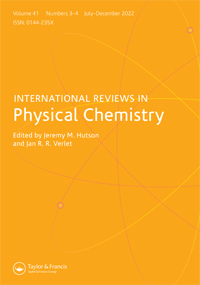Criegee中间体的单分子衰变动力学:能量分解速率、热速率及其对大气的影响
IF 2.5
2区 化学
Q3 CHEMISTRY, PHYSICAL
引用次数: 17
摘要
烃基中间体是烯烃臭氧分解过程中形成的活性物质。它们随后的化学反应对于计算OH的产生、气溶胶的形成和大气的氧化能力至关重要。Criegee中间体在大气中的命运是由双分子和单分子过程之间的竞争决定的,因此了解单分子衰变是大气化学和物理化学的一个重要课题。Criegee中间体的单分子衰变动力学对取代基的性质和构象很敏感。多种异构化途径是可能的,一些结构能够有效地进行1,4-氢转移反应,并且通常与双分子反应竞争。提供能量分解速率常数(k(E))的实验研究为RRKM计算提供了基准,可以外推到大气条件下的热速率常数(k(T))。在一系列同源Criegee中间体中k(E)和k(T)值的比较提供了对结构,能量学和隧道在这些物种的单分子衰变动力学中的作用的见解。替代的单分子衰变途径也阐明了克里吉中间体动力学的各个方面。这些途径不太容易受到隧道效应的影响,可能比氢转移过程慢或快,因此或多或少与双分子反应竞争。本文章由计算机程序翻译,如有差异,请以英文原文为准。
Unimolecular decay dynamics of Criegee intermediates: Energy-resolved rates, thermal rates, and their atmospheric impact
ABSTRACT Criegee intermediates are reactive species formed in the ozonolysis of alkenes. Their subsequent chemistry is critical to an accounting of OH production, aerosol formation, and the oxidative capacity of the atmosphere. The fate of Criegee intermediates in the atmosphere is determined by the competition between bimolecular and unimolecular processes, so an understanding of unimolecular decay is an important topic in both atmospheric and physical chemistry. The unimolecular decay dynamics of Criegee intermediates is sensitive to the nature and conformation of its substituents. Multiple isomerisation pathways are possible, with some structures capable of a 1,4-hydrogen transfer reaction that is efficient, and generally competes with bimolecular reactions. Experimental studies that provide energy-resolved rate constants (k(E)) offer benchmarks for RRKM calculations that can be extrapolated to thermal rate constants (k(T)) under atmospheric conditions. The comparison of k(E) and k(T) values among a series of homologous Criegee intermediates provides insights into the role of structure, energetics, and tunnelling in the unimolecular decay dynamics of these species. Alternative unimolecular decay pathways also illuminate aspects of the dynamics of Criegee intermediates. These pathways are less susceptible to tunnelling, may be slower or faster than hydrogen transfer processes, and thus more or less competitive with bimolecular reactions.
求助全文
通过发布文献求助,成功后即可免费获取论文全文。
去求助
来源期刊
CiteScore
14.20
自引率
1.60%
发文量
5
审稿时长
1 months
期刊介绍:
International Reviews in Physical Chemistry publishes review articles describing frontier research areas in physical chemistry. Internationally renowned scientists describe their own research in the wider context of the field. The articles are of interest not only to specialists but also to those wishing to read general and authoritative accounts of recent developments in physical chemistry, chemical physics and theoretical chemistry. The journal appeals to research workers, lecturers and research students alike.

 求助内容:
求助内容: 应助结果提醒方式:
应助结果提醒方式:


